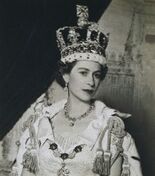Coronation
Jump to navigation
Jump to search

A coronation is a ceremony in which a monarch is vested with symbols of their royal authority, typically including a crown. Other items bestowed may possess symbolism of national or religious importance. Coronations have lost popularity in macronational constitutional monarchies in favor of simpler and often more secular enthronements or inaugurations. In micronations, however, coronations are often an important ceremony marking the accession of a new monarch.
Examples of micronational coronations
- In the coronation of the Emperor of Austenasia, held at Wrythe, the new sovereign receives the Imperial Diadem and the other crown jewels while wearing ceremonial robes. The first Austenasian Emperor, Terry, swore an oath to the people and was crowned by the nation's founder, while his successor crowned himself and swore no oath.
- The Cenna of Lycem receives at their coronation the royal headgear and makes a promise to rule according to the law through a Lycene ritual called surukaeminar, in which copies of the founding documents are tied to a bone and burned.
- The Überstadti monarch is crowned at the Royal Residency by the Prime Minister to show allegiance to the people of Überstadt. The sovereign receives the royal crown and the Scepter with the Chicken.
- The coronation of the Tsar of Phokland is conducted at a state dinner held in Rosston (the Phoklandian capital). The incoming monarch is gifted the royal crown of the nation and is given a blue sash as a symbol used to distinguish the individual as the Monarch of Phokland during occasions when the wearing of a crown would be seen as inappropriate.
- The coronation of the Sultan of Tungristan, held at the Throne Room in the Harikaşehir Mosque, the new sovereign receives the Sultan's Crown and the other crown jewels while wearing imperial robes. Normally, the Sultan would swear an oath like how Mehmet I used the shahada as a oath and that which continued in coronations of the sultan.
- The coronation of the emperor of the Kappan Empire is a swift and private affair where the new emperor dons his/her crown and stands before his/her subjects.